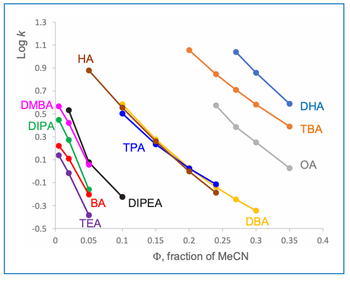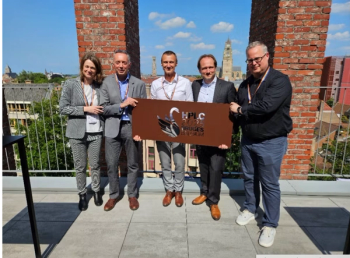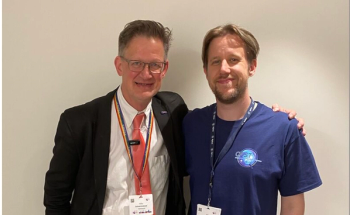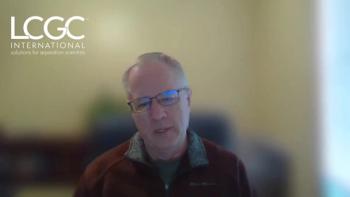
- LCGC Europe-02-01-2017
- Volume 30
- Issue 2
Going Through Phases
Peter Myers from the University of Liverpool (Liverpool, UK) spoke to David McCalley from the University of the West of England (Bristol, UK) about the past, present, and future of stationary phases, and his working life in academia and industry.
Peter Myers from the University of Liverpool (Liverpool, UK) spoke to David McCalley from the University of the West of England (Bristol, UK) about the past, present, and future of stationary phases, and his working life in academia and industry.
David McCalley: When did you first discover chromatography and what attracted you to this subject?
Peter Myers: I always wanted to become a photographer. It was my science teacher, Tim Packer, that suggested that it would be a good idea if I got a really good understanding of the chemistry involved in the photographic process, so I went to university to study chemistry-before I became the next David Bailey. This, as you know, never happened, first of all I met a girl called Susan Wadsworth who became, and still is, Mrs. Myers so I stayed at Salford for my Ph.D.
I did my Ph.D. at the University of Salford (Salford, UK) in maths, physics, and chemistry. The group was led by Denise Price and John Lippiatt. We developed a timeâofâflight mass spectrometer (TOF-MS) to monitor fast gas phase reaction kinetics. Over coffee one day the idea came that we could use the TOF-MS to detect and analyze the output from a packed gas chromatography (GC) column. This we did. It was very difficult using a 6-mm i.d. glass column because we had to have all the pumps working flat out in the mass spectrometer just to maintain some vacuum. I think we were one of the first groups to do this, but as it was not our core research we never published.
DM: Who was your greatest influence and why?
PM: There were two people. First, my Ph.D. supervisor John Lippiatt, who taught me good science, maths, and programming and how to not get so excited about results.
The other of course was Denis Desty. Denis was totally the opposite of John Lippiatt in that Denis was very excitable, and on many occasions it was me who had to keep Denis under control. Denis taught me to follow my instincts. He taught me to look for funny results and try to explain them. As Denis said, there are no Eureka moments but there are many “that’s strange” experiences. Follow these. He also taught me that science was expensive. Always triple your budget and don’t be afraid of overspending. That was maybe OK for Denis, who on one BP project overspent by £1 million. Try and do that today!!!
But above all Denis gave me enthusiasm. Experiments didn’t stop for Denis when he left the laboratory, he just continued work in his garage at home. I was with him when we set fire to the garage and blew up his wife Doreen’s cooker. My wife Sue is equally tolerant with me; when I get very involved in a project I still carry it on until I drop. Sue has had to call me many times suggesting that at 4:00 am it is maybe time for me to come home.
DM: In 1979 you joined Phase Separations to develop new processes to manufacture porous silica. Can you tell us why you focused on this area of research and how you overcame the problems associated with the traditional manufacturing processes at the time?
PM: In the late 1970s, Phase Separations (PS) licensed a process from Harwell on the manufacture of spherical silica suitable for chromatography. I was brought into PS to try and understand the science behind this process and to try and control the batch-to-batch reproducibility on both the surface of the silica and the particle size from the raw batch. Through inâdepth research we understood the basic principle of the formation of spherical silica, which was then applied to the silica manufactured by Phase Separations. Phase Separations became the world’s largest supplier of original equipment manufacturer (OEM) silica. The changed process was sold with PS to Waters in 1995 and remains a closely guarded secret.
DM: Phase Separations was known as a truly innovative small company. Do larger companies have too much inertia to be as innovative?
PM: PS was a small company. At our main base in Deeside we had about 50 people: sales, manufacture, and R&D. We were successful because we were a very close group, even today we still meet and three of us even play golf together.
We had no committees. Someone was given a task and implemented that task by talking to people and then acting on the information. We also talked extensively to our customers, listened to what they had so say about our products and lack of products, and tried to act on that data. For our R&D we supplemented our research with the research from the Universities of York, Leeds, Northumberland, and Glasgow. It was through these contacts that I drifted back into academia in 1997. So yes, I am a believer in the small companies; however, large companies could become more innovative-they just need to remove many layers of management and committees.
DM: Can the demands of customers for reproducible stationary phases that are available consistently over a period of many years sometimes act as a brake on innovative developments in this area?
PM: No, this demand should lead to innovation. Maybe not in the direction of which it was intended (that is, silica) but into other support areas. I think we did this in PS, but many of the new support ideas were not taken up by the instrument companies.
DM: What is the future of column packings in liquid chromatography (LC)? Will silica remain the main material?
PM: It will, but I do hope that some PhD student will find a new way of identifying analytes in complex mixtures. Some say this can be done already with mass spectrometers. Maybe it can, but people will still have to put some form of chromatography in front of the mass spectometers.
DM: What do you think about new developments in LC stationary phases such as pillar array column?
PM: I love any new development. Pillars have been around for a few years and have not shown the results we had first hoped. But the processes of cutting ceramics is developing and maybe we can soon cut smaller pillars. We are seeing real developments in ink jet printing where, of course, we can generate 3D structures. Each device is identical. Wouldn’t that be great for column-to-column reproducibility! I am also very interested in the use of simple molecule wires that can act as sensors, and also the very latest developments in size-exclusion chromatography when the change of electric field is measured through a very small hole as the analyte passes through.
DM: You suggested the use of compact discs and CD players for centrifugal chromatography. What happened to this idea?
PM: Lack of funding is the simple answer. I have never been able to get anyone interested. The big companies are currently focusing on high-pressure pumps for ultrahigh-pressure liquid chromatography (UHPLC) systems. Centrifugal chromatography does not require any pumps. The large funding bodies are not very supportive of “fundamental” chromatography research because it is classed as a “mature subject”.
DM: What has been your greatest achievement in your time in academia?
PM: Educating bright researchers and becoming close personal friends with them. The new PhDs are our future; I only wish our government would understand this. I recently talked through the University of Liverpool to researchers in Japan. They pointed out the similarities between our two countries. We both no longer have any natural resources; I suppose the UK has coal but a lot of work needs to be done to make that a clean fuel. All the Yorkshire oil and gas in the North Sea has nearly gone. We have lots of chalk but we currently do not have a big demand for that. What the UK and Japan do have are great brains. The difference is that Japan is investing in its brains, while the UK is making them pay to be educated. I hope by my and others continued lobbying that we can change this and remove tuition fees. That would be a great achievement and would be of real benefit to our country.
DM: What is your group focusing on at the moment?
PM: We are still looking at novel ways of making porous particles and bonding ligands onto the particles. We can now make totally porous ceramics to a given particle size range, thereby removing the need for post classification of the particles. We are continuing our work on new bonding methods all based around microwave and other non-classical reflux methods.
We are also looking at total sample sensors. We are trying to form images of solutions-the images are indicative of the analytes present-and there is therefore no need to separate, just determine what’s in the solution from given patterns provided by our new sensors.
And we are still trying to replace the “old fashioned” bench HPLC with a portable HPLC system. These new portable HPLC systems would not have any pumps.
DM: You know the field of chromatography users, manufacturers, and academic researchers very well. How did
the interaction between these groups change over the last decades? And how did that affect the development of chromatography?
PM: Academic groups have got smaller and smaller in the UK and have also reduced in all other countries. This has resulted in manufacturers doing more and more research and development, but most of this has been development. Hence we haven’t seen the real step changes that have occurred in other industries where there has been a lot of academic research that could feed ideas for development into industry.
I remember Denis Desty telling me the excitement he had when he listened to McWilliams’s lecture on the flame ionization detector. He couldn’t wait to get back to his laboratory to build one out of a treacle tin and platinum electrodes. Another point is that people in industry are just not allowed the time to attend discussions. This to me is very shortâsighted by the companies. They expect analysts to be selfâtaught. This has resulted in very narrow learning and a reduction in the attendees at meetings organized in the UK by The Chromatographic Society and the RSC Separations group. Unless something changes the inwards spiral to destruction will continue.
DM: You sometimes seem negative about the future of separation science in the UK. What needs to change?
PM: The whole funding system for “fundamental” chromatography research needs to change. If it does not, then fundamental research into separation science in the UK will stop. Existing analytical techniques should receive some funding for “fundamental” research. Industry and academia also need to form stronger collaborations. UK universities will also need to ensure “post-Brexit” that they receive sufficient funding. If the funding situation changed I am convinced we have the brains in this country to deliver new concepts for separation science.
DM: In a more positive environment for fundamental research what areas do you think should be investigated that would eventually benefit the chromatographer in practice?
PM: For chromatography, I would go back to basics and try to understand the real physical nature of surfaces. I believe we are stuck in one area and all we are doing in today’s work is making small increments in the very small area we work in. For example, we use silica and bonded phases. What has changed in the past 20 years? Particles have got smaller, particles are cleaner, and maybe we have more reproducible bondings. But these are just small increments. We need to move completely away from this area. One way to do this is to use the new molecular and surface models that are available. Let’s use “in silico” modelling to design totally new materials and use the “in-silico” screens to test them. If any look practical, then let’s try and make them. These materials will (hopefully) be nothing like the materials we have today.
DM: Do you have any advice for younger (or older) separation scientists who want to make an impact on the evolution of separation science?
PM: Remain enthusiastic. Steve Jobs answers this question far better than I can:
“When you grow up you tend to get told that the world is the way it is and your life is just to live your life inside the world. Try not to bash into the walls too much. Try to have a nice family life, have fun, save
a little money. That’s a very limited life. Life can be much broader once you discover one simple fact: Everything around you that you call life was made up by people that were no smarter than you. And you can change it, you can influence it… Once you learn that, you’ll never be the same again.”-Steve Jobs
I can give no better advice than that.
Articles in this issue
almost 9 years ago
Filters and Filtration in Liquid Chromatography—What To Doalmost 9 years ago
What Exactly Are Raw Data?almost 9 years ago
Vol 30 No 2 LCGC Europe February 2017 Regular Issue PDFNewsletter
Join the global community of analytical scientists who trust LCGC for insights on the latest techniques, trends, and expert solutions in chromatography.




